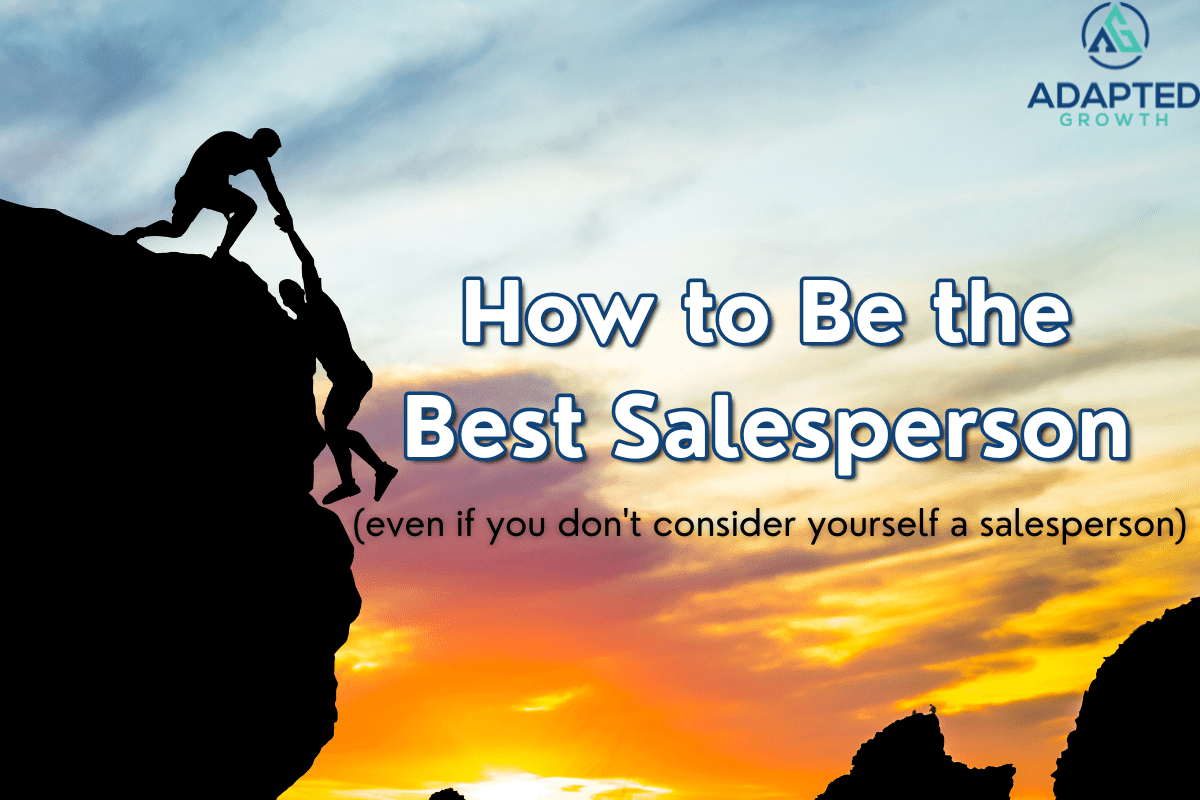I get it; you probably think you don’t need a sales process. Maybe you don’t; I certainly didn’t for a very long time. But I’ve since come to realize that A) it will probably make your life/career a lot easier, and B) the best sales method shouldn’t feel like a tactic or method at all.
That’s why I developed my own. Many popular ones are outdated, too technique-focused, and honestly, irrelevant in some cases.
See, I want to teach the world to sell better and in a way that helps people trust us more. When companies and consumers value salespeople, everyone benefits. And a sales method that supports that cause is vital.
I believe this so strongly that I wrote a book about it!
Hence, SHERPA.
As a sales strategy, it’s an effective and proven starting point for helping salespeople achieve their goals. There’s more to it, though.
Fundamentally, it’s about:
- improving your communication skills,
- enhancing your ability to relate to others,
- and adopting a new mindset that will help you grow in all walks of life.
In that context, it ceases to be about selling. Candidly, it’s the best sales approach because it’s about human-to-human connection and better communication, within and outside of your sales conversations.
Table of Contents
- But first, what kind of sales method is SHERPA?
- So, how does this sales method help you outside of sales?
- Communication as a Sales Method
- How Better Communication Helps Every Interaction
- Relating to Others
- The Best Sales Method Helps You Shift Your Mindset
- The Best Sales Method for Complete Self-Improvement

But first, what kind of sales method is SHERPA?
SHERPA is an acronym that stands for the six traits that I believe the most successful salespeople carry and hone.
It stands for:
- Skeptical
- Helpful
- Empathetic
- Resolute
- Practiced
- Accepting
As I’ve said, it’s not just a process for sales but a guide to better communication in all of your relationships. But the foundation of it is how I navigate my sales conversations to help them be as effective and meaningful as possible.
Here’s what each trait means for salespeople.
Skeptical
Skepticism may sound negative, but in the proper context, it can actually make you a better conversationalist.
Everybody in sales will tell you that you should lead conversations with questions. For me, it’s more than just asking, “what are you struggling with?” or “don’t you wish that could be better?”
Skepticism allows me to keep an open mind when prospects answer my first level of questions. Very few will spill their guts to you right off the bat. If you maintain some skepticism, you can dig deeper into what they really mean or what they’re actually struggling with.
When you build this into a sales method, you’ll develop an easily adaptable series of questions that will build trust, find the root of their problem, and help you offer the right solution.
Helpful
If you believe in what you sell, you know it can be hugely beneficial to people who need it. But without the right mindset going into your sales conversations, people only think you want to sell them something.
When we lead conversations with helpful intent, we go from being “just another salesperson” to a trusted advocate for their needs.
Getting that across won’t be easy if they’re already suspicious. But combining a salesmethod, helpful mindset, and the other SHERPA traits will make it more achievable.
Empathetic
Every sales coach or self-improvement guru says we all need to be more empathetic in our interactions.
For most people, that’s not a huge problem. For others… it just doesn’t come naturally. (Yes, I’m one of them.)
Personality assessments are enormously helpful in showing how naturally people-focused you are and how to modify your communication style as needed if you aren’t.
Luckily, you can learn to weave empathy into a salesmethod by asking specific questions and developing the right mindset around selling.
Again, all of these traits work together.
When you’re empathetic for how your prospects are feeling and thinking, you’ll have significantly better conversations.
Resolute
This one may sound like it doesn’t belong, but there are a lot of areas in sales where it’s too easy to give in or give up.
Being resolute helps you succeed by holding yourself and others accountable to the agreements and expectations you set with each other.
It also helps you maintain your standards when qualifying clients or explaining your position.
There’s always room for flexibility in your process or salesmethod, but being resolute in the most important aspects will help you gain the respect and trust you need to develop relationships.
Practiced
As with everything in life, you only get better when you practice.
Sadly, few salespeople are given a chance to practice their selling and conversation skills with anybody other than real-life prospects. Even when they have a strategy, they rarely factor practice into it.
Repetition and analysis make a huge difference though. If you find the right space to do it, you’ll be a much more practiced and confident salesperson very quickly.
Accepting
If you’ve been in sales for a while, you already know that it involves a lot of rejection. It’s rough, but it comes with the territory.
However, the more accepting you are of rejections or “maybe later’s,” the more you’ll see that they’re actually good things.
Losing unqualified prospects frees up your time for better ones. And if you can navigate the conversation with acceptance and helpful intent, you still have opportunities for future business.
So, how does this sales method help you outside of sales?
Here’s the thing; everybody could probably stand to improve their communication and listening skills.
You might not think a sales method could help you with that, but the six traits that make up SHERPA are often seen as the same traits that make you a good friend, a loving partner, or a caring parent.
Okay, you might not think you need to practice conversations with your spouse. Well, guess what; the more you focus on your soft skills, the deeper your relationship will grow.
So let’s dig into why I believe SHERPA can help anybody regardless of their career.

Communication as a Sales Method
Pretty much everybody assumes they communicate well, or at least as well as they can. Most of us spend our lives just winging it in hard conversations with our kids, fights with our partners, and heart-to-hearts with our friends.
Whether the conversation is happy, sad, mad, or anything in between, we just talk. Usually without thinking. Definitely without planning except in rare cases.
And most people also listen without much thought, which means we don’t do it as well as we think.
Almost everybody could benefit from being more aware of how they communicate and interact. Even the easiest, lightest conversations become more meaningful when both sides are more mindful and present.
That’s why a sales method can help you deepen your personal relationships.
When I coach people in their sales conversations, I typically use real-life, personal examples from situations with my partner.
Better Communication IRL
My partner and I have been together for almost 20 years. Like most relationships, we’ve had our fair share of arguments. Most of them happened because we didn’t know how to say what we really wanted to say.
It took more years than it should have, but we eventually learned how to communicate better. And it’s mostly thanks to sales coaching.
I’m not saying we wouldn’t have made it this far without having a sales method as the backbone, but it sure helps!
I also talk a lot about my kiddo. Learning how to convey my reasons and beliefs to a child while being mindful and listening to her perspective has helped me push my conversational abilities to the max.
Honestly, it’s made me a better dad.
How Better Communication Helps Every Interaction
That’s why I push the need to focus on better communication so much. It doesn’t just help you win more deals or reach your quota easier. It helps you have better conversations in all aspects of your life.
- You’ll have more understanding from your boss when you feel confident questioning them.
- Open discussions with important people in your life will be more comfortable. And you’ll have an easier time seeing where they’re coming from.
- You can be more prepared to help your friends solve serious issues by asking the right questions and uncovering their real problems.
Even random, casual conversations will be more enjoyable because of how you navigate those moments.
When you listen better and communicate more mindfully, you’re more fun to talk to, plain and simple. Plus, better communication leads to more confidence, in sales and otherwise.
Plus, better communication encourages deeper relationships. Not just the ones between you and your clients, although that will undoubtedly make your professional life easier.
Being more intentional about how you both talk and listen builds a level of trust that creates a bond. My partner and I grew much closer because we finally learned how to express what we really wanted to say.

Relating to Others
Knowing where your prospects are coming from is an enormous benefit for having great sales conversations. I honestly don’t know how anybody closes a deal without understanding their client’s pains or needs.
The level of empathy that makes a salesperson great also typically makes them a kinder person all around.
When you’re able to put yourself in other people’s shoes, it’s easier to judge less, debate more effectively, and maintain an open mind. It also helps you find common ground that can conquer the divide between a stranger and a friend.
We’ve forgotten how to relate to each other because so much communication occurs at a distance. For example, everybody knows you’re not supposed to judge others, but scrolling through Facebook to judge people’s posts doesn’t feel like it counts.
It does.
Meaningful conversations can only occur when you’re trying to see somebody else’s point of view. I might’ve struggled with this more than some people. The more task-driven you are, the harder it is to empathize with others.
When I realized that and worked towards improving it, it made a massive difference in how I communicate with and react to others. I don’t judge as much, I strive not to make assumptions as quickly, and I ask better questions to understand what someone else is thinking or feeling.

The Best Sales Method Helps You Shift Your Mindset
Being a Sherpa also means having a ‘mindset of abundance.’ In sales, this means not chasing people down forever, being able to accept a ‘no’ from prospects, and focusing more on the actions you control rather than the results you don’t.
It’s a sales method and mindset that has made my job so much easier!
Even better, it helps you in all aspects of your life. It allows you to stop focusing on the little things and not to let minor disappointments become tragedies.
Getting through the stress of daily living is hard on the best of us. And it’s difficult not to hang so much importance on everything. But when you’re living in a fixed or limited mindset, one that tells you every opportunity is your last, that makes your life even harder.
On the other side, when you have an abundant mindset, it’s simpler to take things day by day and live in the moment.
For example:
You’re up for a big promotion.
If you’re in a limited mindset, you’re probably stressing over it every second of the day. If you’re not, then you’re probably not overthinking it. At the very least, you’re not letting it affect your work or your mood.
Then, you don’t get it.
With a limited mindset, you’re crushed. You feel cheated, contemplate quitting, and you don’t know what your future holds. Worst of all, it’s unlikely that you’ll take the time to learn what you could’ve done differently to improve your chances in the future.
Too often, people in a limited mindset just give up.
On the other hand, with an abundant mindset, you congratulate whoever did get the promotion because you’re genuinely happy for them. You talk to your boss to find out how they came to that decision, and you keep the lines of communication open about being interested in future promotions. Then, you go about your business because you know that there’ll be other opportunities down the road.
That’s not to say having a mindset of abundance is easy; it’s absolutely not. But when you can achieve it, your life is more enjoyable and peaceful.
Trust me; I’m not fully there every day of my life. I don’t know anybody who is. However, I think and journal about it enough that I can maintain that attitude reasonably sufficiently. There are moments when I lose it, but for the most part, I’m pretty good at remembering that there are always more days, more opportunities, and enough to go around.
The Best Sales Method for Complete Self-Improvement
I didn’t create Sherpa as some answer to a salestactic that I believed didn’t work. It’s a process that evolved through my own experience and from reading and learning from many resources.
Yes, other methodologies have influenced parts of it. I wouldn’t pretend otherwise.
But my approach comes from more places than just sales, such as martial arts, poker, philosophy, and psychology. These things have influenced how I practice, think, and communicate. And, of course, the way I sell.
I know it can work for many people because it works for me.
At first, I didn’t realize that, as my methods slowly improved, they were changing my interactions with those around me. They were, though, for the better. And they’ve helped me become more confident and overcome any fears I once had about selling.
So when somebody asks if I ever talk about anything other than sales, I smile because I believe anybody can benefit from what I discuss since it goes so far beyond sales. You just have to be open to thinking about it on your terms.
And as far as choosing the most appropriate sales method for yourself, I would humbly suggest starting with SHERPA and then building it into your own.









